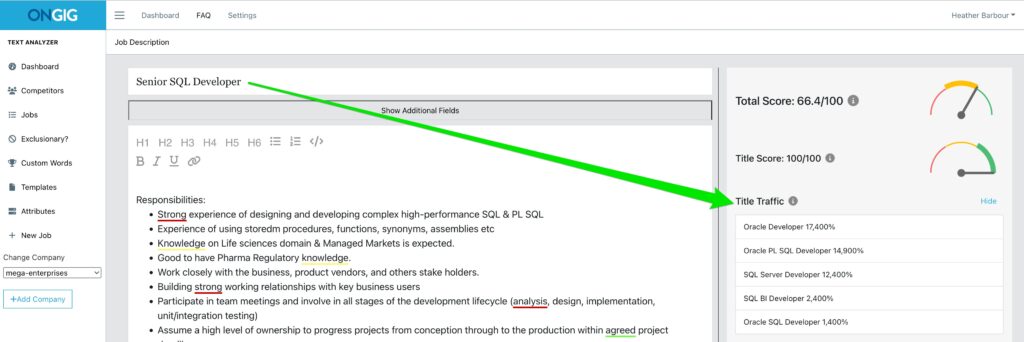- Why I Used Grok + Gemini and ChatGPT to Build My Outreach List (And How Recruiters Can Too) - January 22, 2026
- The Diversity & Inclusion Glossary — A List of 300+ Helpful Diversity Terms (2026 Update) - January 19, 2026
- Why You Need a Job Description Revision Tracker (Before Your Next Audit) - January 9, 2026
What’s the difference between internal vs external job titles? It depends on who you ask.
Some companies use the same internal titles for their external job postings. Other companies have 2 different versions — 1 for internal job descriptions and 1 for external postings. Either way, the job titles you choose affect who finds your roles online (and applies for them).
Let’s dig in.
What’s the difference between internal vs external job titles?
Internal job titles are tied to compensation levels, job codes, or requisition IDs. Your HR team probably uses internal titles to keep track of different levels of the same role. Internal job titles are part of an internal job description that outlines an employee’s daily duties.
External job titles are used externally for job postings to advertise roles on careers sites and job boards. They are more SEO-friendly and perform best if kept short (between 1 to 3 words and less than 20 characters). External titles (post-hire) might also vary from the title on the job posting you applied for.
3 examples of internal vs external job titles
There are different scenarios for using internal vs external job titles. Here are 3 examples:
Say your Finance department has various internal titles for one role like:
- AP Assistant I
- AP Assistant II
- AP Assistant III
- AP Assistant IV
- and so on
These variations of the internal title are all assigned their own job code and probably have different requirements, responsibilities, and salary ranges.
Some hiring managers might copy/paste those titles into their job postings. But, others might use the external title “AP Assistant” in their job postings (and leave off the “I, II, III, IV, etc.”) to keep their title more simple (and searchable).
Job seekers are probably not searching for “AP Assistant IV” on Indeed or LinkedIn. So, in this case, I recommend dropping the “IV” and using an external title like “AP Assistant.” This will help you show up higher in job board searches. Thus, making it easier for more people to find your ads (and apply).
Another example:
Some brands get creative with their job titles, which is fun. But it doesn’t always translate to people applying. Here are some internal titles job seekers aren’t searching for (even if they sound cool):
- Colon Lover — “Colon Lover jobs” gets zero queries per month on Google. “Copywriter jobs” gets 3,100.
- Sales Rockstar — “Sales Rockstar jobs” gets zero queries per month on Google. “Sales Representative jobs” gets 3,900.
- Happiness Hero — “Happiness Hero jobs” gets zero queries per month on Google. “Customer Service Representative jobs” gets 2,200.
In this case, keep the funny and creative titles like “Chief Geek” (CTO) and “Money Maestro” (Accounting Manager) for internal use once someone is hired. But use the “search-friendly” external titles to get more visibility for your postings.
And here’s one more example of internal vs external job titles:
In software roles, sometimes the longer (more specific) external job titles help candidates understand what they’re applying for. So in this case, the internal titles often match the external titles.
For example, many companies use “Junior Python Developer,” “Senior SQL Developer,” or “Java Developer” for both internal and external job titles instead of just “Developer.”
Since there are so many different types of “Developers” you’ll want to be specific when you post externally and you can match your job codes/compensation info with these internal titles too.
So, if you do decide to switch up your external titles, Ongig’s title traffic feature gives you suggestions based on titles candidates search for on Google:

And, if you need more job title inspiration, Job Titles: The Definitive Guide includes best practices on job titles including lists of titles by hierarchy and departments. Note: These are built into Ongig’s Text Analyzer software.
The Influence of Job Titles on Your Career Growth
Knowing how job titles, whether inside or outside a company, can affect your career is really important. Let’s look into how these titles shape your career, open up opportunities for moving forward, and help you grow professionally.
First, the job titles you have within a company are important. They show where you stand in the company, like if you’re just starting out or if you’re in a higher position. So, starting from simpler jobs and going up to more important ones, these titles help guide where your career is headed. As you keep going, the things you’re supposed to do and the skills you need for your job title usually change. This also affects how you learn and get better at what you do.
But, looking at job titles outside your company is important too. They really matter in the bigger job world. Different industries and companies might call similar jobs by different names. So, knowing these titles outside your workplace helps people find the right chances to grow in their careers.
Why I wrote this:
Ongig’s mission is to create effective and inclusive job descriptions. Helping you choose to use internal vs external job titles so you attract top talent (and get more applies) is part of that mission. If you’d like to learn more about Ongig’s software, please request a demo.
